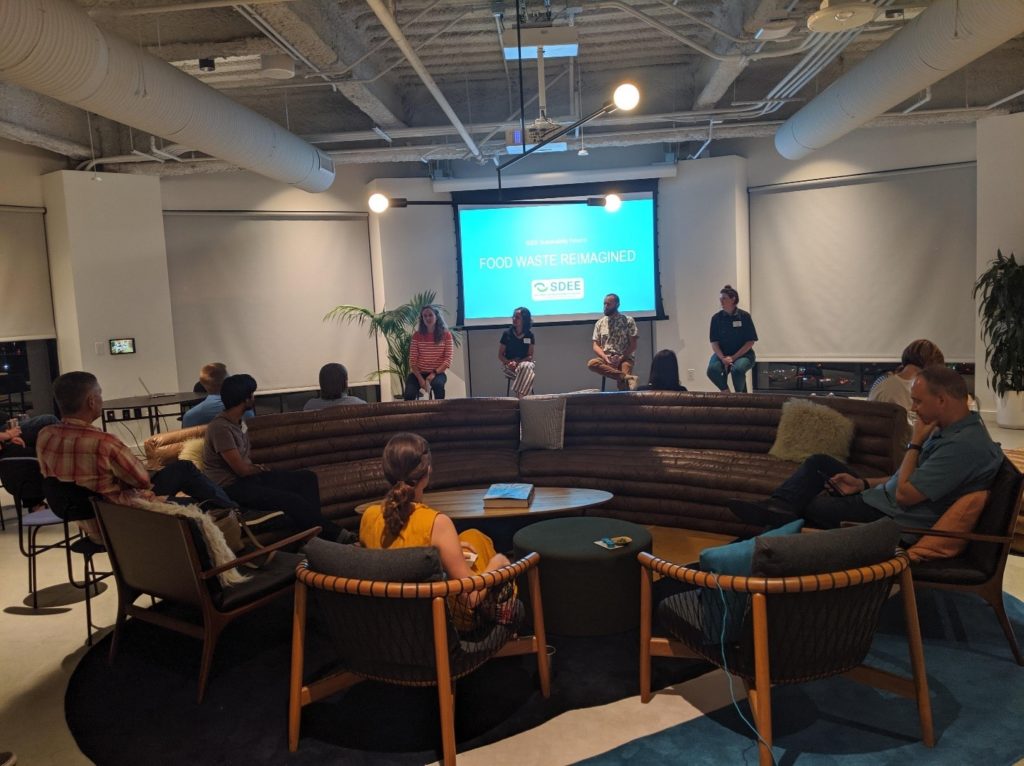Entrepreneurs like Elizabeth Murphy, Sarah Boltwala-Mesina, and Jonathan Zaidman are starting companies to help people who are concerned about sustainability easily minimize food waste. From plant-based catering, to composting, to food production—sustainability is a unifying theme. We heard about their efforts at “Food Waste Reimagined,” an event hosted by the SDEE Sustainability Group held on October 24 at WeWork UTC, sponsored by Morrison Foerster and Struthers Family Trust.
 Moving along the continuum of growing food to cooking food to disposing of food waste, Jonathan opened the panel describing his program at The Ecology Center. The mission of the center is to model an abundant, thriving community ecosystem, based on a principle called permaculture, or ecological design. With an initial model system in San Juan Capistrano, Jonathan started the Encinitas location to bring this same offering to the San Diego community. Through composting, food recovery, and preservation they demonstrate how to eliminate waste on the farm, which is where a large chunk of food waste comes from. They run programs such as gardening, bee keeping, wave water harvesting, a farm stand, and farm-to-table dinners. By creating these accessible spaces, they create value-added experiences and hope to inspire people to incorporate these practices into their daily lives.
Moving along the continuum of growing food to cooking food to disposing of food waste, Jonathan opened the panel describing his program at The Ecology Center. The mission of the center is to model an abundant, thriving community ecosystem, based on a principle called permaculture, or ecological design. With an initial model system in San Juan Capistrano, Jonathan started the Encinitas location to bring this same offering to the San Diego community. Through composting, food recovery, and preservation they demonstrate how to eliminate waste on the farm, which is where a large chunk of food waste comes from. They run programs such as gardening, bee keeping, wave water harvesting, a farm stand, and farm-to-table dinners. By creating these accessible spaces, they create value-added experiences and hope to inspire people to incorporate these practices into their daily lives.
Liz is founder and chef at Santosha Nutrition. She prepares food sourced from local, sustainable agriculture communities and finds local resources for sustainable disposal. Having worked in the hospitality, restaurant, and hotel industry, she saw a lot of waste and began to see it in her own life and community. That drove her to start Santosha where she intertwines her passion for cooking and sustainability, creating an accessible resource that demonstrates what’s possible. At her full-service events, she’ll take clients to a farmer’s market, teach them to prepare meals from their purchases, and show them how to dispose using composting bins. Liz says she won’t sacrifice her mission in the process of doing business. This means buying locally, purchasing compostable place settings instead of plastic, and serving only vegan dishes and not obliging requests for meat and cheese trays. Sometimes this means she has to charge higher prices, so she repeatedly shows the whole value of what she’s providing.
Sarah is founder of Inika, a resource for composting. After spending a frustrating year helping students sort lunch waste at her child’s school, she became passionate about re-routing waste from the landfill. At Inika, she’s tackling government policies and ordinances to enable corporate composting. Through her services, Inika and Food2Soil train people to compost at home, provide collection centers, and offer pick up services to collect and compost food scraps. All in an effort to divert food waste from the landfill. Sarah is continuously battling the consumers’ view of the services because she has to charge for something people are used to getting for free. She maintains that anyone can compost in their backyard on their own. The value is not only having someone else do it for you, but also helps you adopt sustainable practices.
All three entrepreneurs are working to change our relationship with waste and provide alternatives and resources to help change our behaviors. If you are interested in learning more, please check out the resources below and sign up for the SDEE newsletter on our home page to hear about our next sustainability event.
Resources
The Ecology Center Twitter: @eco_center
Santosha Nutrition Twitter: @Santoshafood
Inika – Food2Soil Twitter: @InikaSmallEarth
Solana Center for Environmental Innovation – Composting services, Twitter @solanacenter
San Diego Food System Alliance Twitter: @sdfoodsys
Soul Much Twitter: @SoulMuchFoods
UCSD Sustainability Twitter: @SustainUCSD
Galley Solutions Twitter: @GalleySolutions

